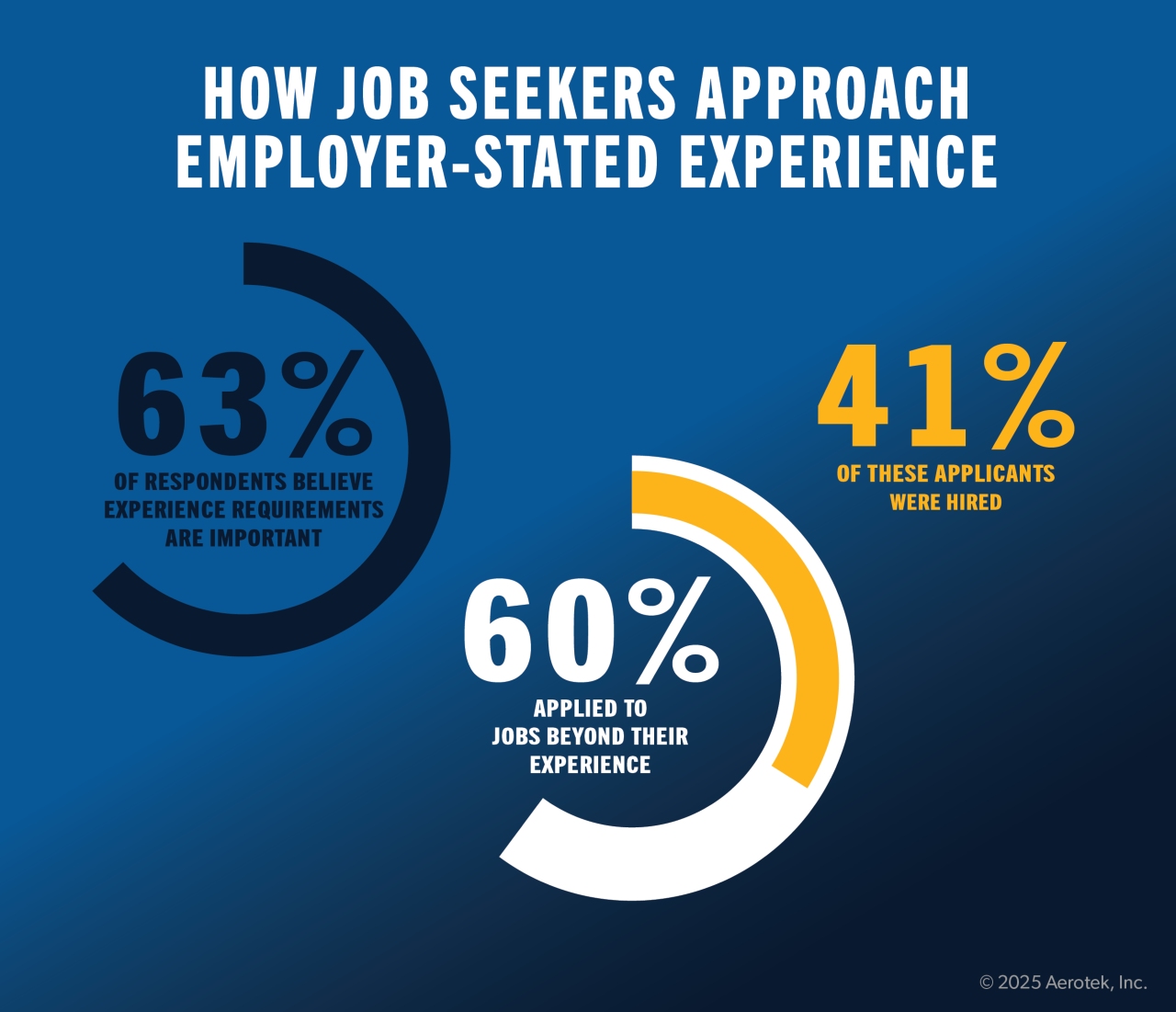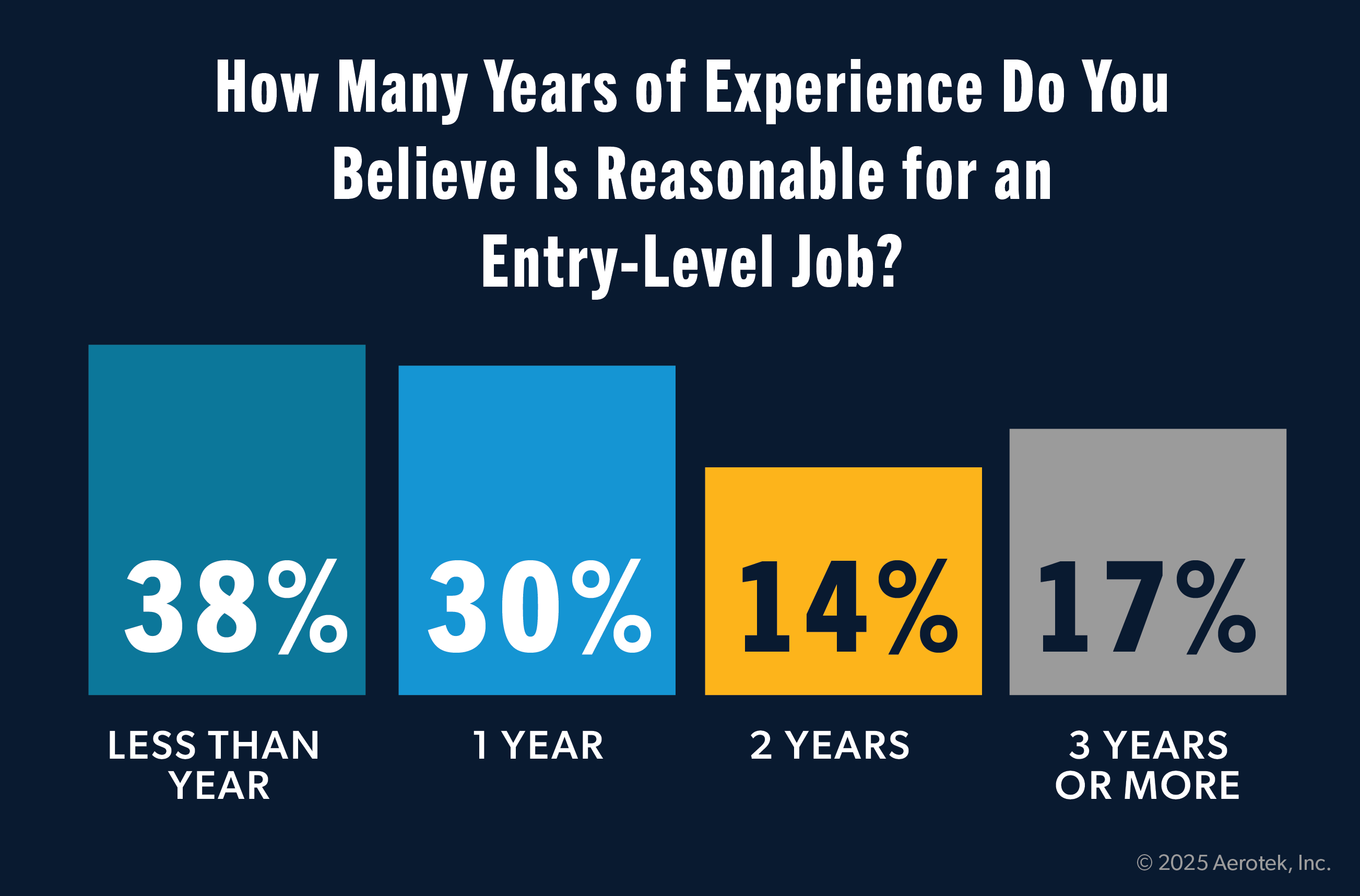60% of Job Seekers Say Entry-Level Roles Require Too Much Experience
Are Current Entry-Level Experience Requirements Effective?
Employers specify preferred experience levels for multiple reasons, and 63 percent of survey participants agree that stated experience requirements hold significance. While experience matters, their effectiveness has come into question, especially for entry-level roles. These requirements can help employers find more seasoned professionals, but the current standards may prevent otherwise skilled, motivated individuals from getting their foot in the door. Notably, a significant portion of those who apply for jobs above their experience level are ultimately hired, indicating that employers themselves recognize potential beyond the resume.
Rethinking Experience Demands in Entry-Level Roles
67 percent of respondents are searching for entry-level jobs and 71 percent feel that employers demand too much experience for entry-level roles. Notably, 60 percent of respondents aged 45 and older are actively searching for entry-level jobs. This concern extends beyond younger professionals and recent graduates, suggesting that accessible opportunities at the entry level matter to a diverse range of candidates.
Experience requirements exist to ensure new hires can contribute productively, but rigid benchmarks can be counterproductive. They may exclude promising candidates who possess the drive, adaptability and foundational skills necessary for success. In a rapidly evolving job market, where new technologies and practices constantly emerge, the ability to learn quickly and apply existing knowledge often outweighs years spent performing similar tasks.
Moreover, this approach can unintentionally narrow applicant pools and reduce diversity in backgrounds and perspectives — a loss for organizations keen to foster innovation and resilience.

Hiring for Transferable Skills vs. Experience in Entry-Level Jobs
Instead of focusing solely on traditional experience markers, employers can look for transferable skills —those abilities learned in one context but readily applied in another.
These qualities are often developed in volunteer work, education, community involvement or previous jobs outside the target field. Candidates who lack exact experience may still excel if given the liberty to demonstrate how their skills apply.
Transferable skills offer employers a new lens through which to evaluate candidates, shifting focus from strict experience requirements to qualities that transcend specific job titles. A few key transferable skills employers should consider are:
● Communication: Both in articulating ideas and listening actively, the ability to communicate is vital across roles, fostering collaboration among colleagues and clients.
● Problem Solving: These skills enable individuals to navigate workplace challenges with creativity, drawing from diverse experiences to generate fresh solutions.
● Adaptability: Industries like manufacturing, logistics and construction are evolving along with other sectors and being able to keep up with technological and regulatory changes is an essential trait. Professionals who can learn quickly and pivot in response to evolving systems and practices help to create a resilient organization.
● Leadership and Teamwork: Leading group projects and working collaboratively demonstrate essential qualities regardless of a candidate’s formal job history.
Candidates who lack exact experience may still excel when given the chance to demonstrate how their broader skill set applies to specific responsibilities. Recognizing and embracing these transferable skills enables employers to uncover and nurture talent that might otherwise be overlooked.
Breaking Down Experience Barriers in Entry-Level Roles
To attract a wider range of qualified applicants, employers should begin by reviewing job descriptions, distinguishing between essential and desirable experience and questioning whether each requirement is truly necessary for success at the entry level. Rather than focusing on years of experience, employers can emphasize the specific skills and competencies needed for the role, making it clear that candidates with diverse backgrounds — including career-changers and older professionals — are welcome to apply. This shift in approach signals an openness to fresh perspectives and cultivates a more dynamic talent pool.
Furthermore, organizations can incorporate skills-based assessments into their hiring process, such as practical exercises or situational questions, which allow candidates to demonstrate their abilities beyond what is listed on their resumes. Once hired, providing thorough onboarding and mentorship ensures that new team members have the support needed to bridge any gaps.
The numbers indicate that candidates are willing to apply for positions even if they do not meet all the listed qualifications in a job description. By reassessing entry-level requirements and focusing on transferable skills, businesses can tap into a broader talent pool.
Ready to break down barriers in entry-level hiring? Contact Aerotek to connect with motivated entry-level job seekers and expand your talent pool.
